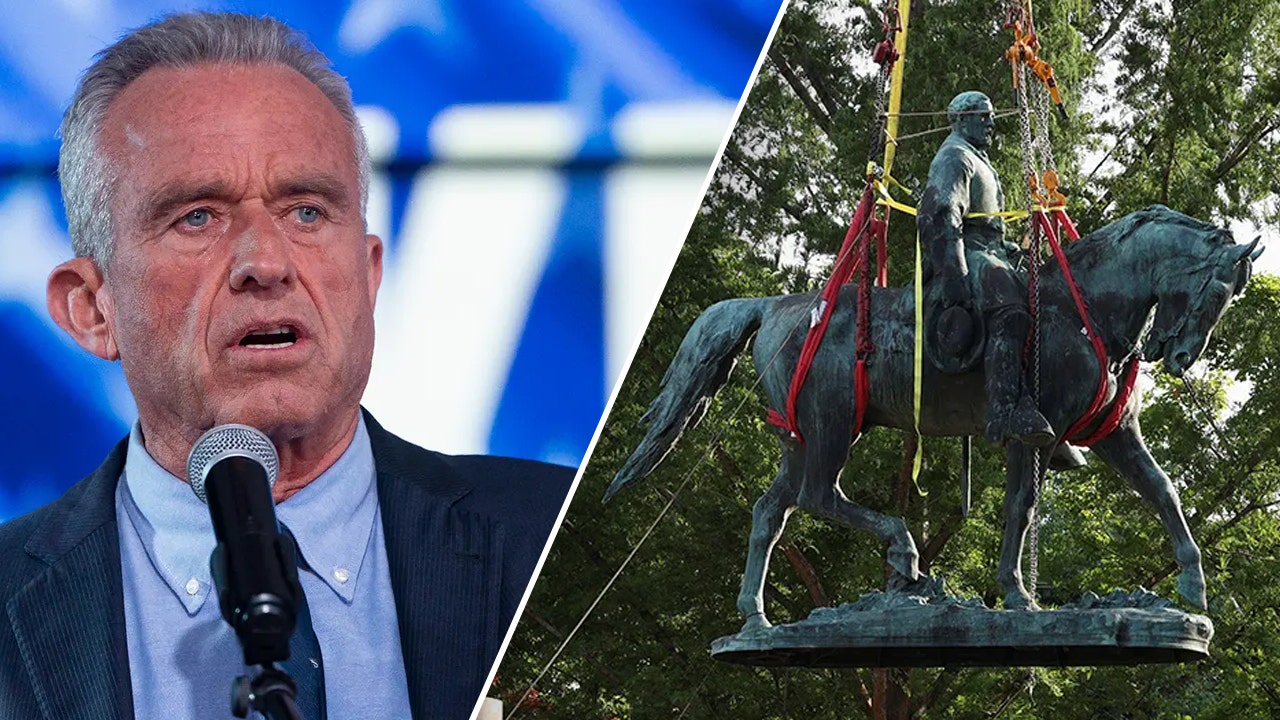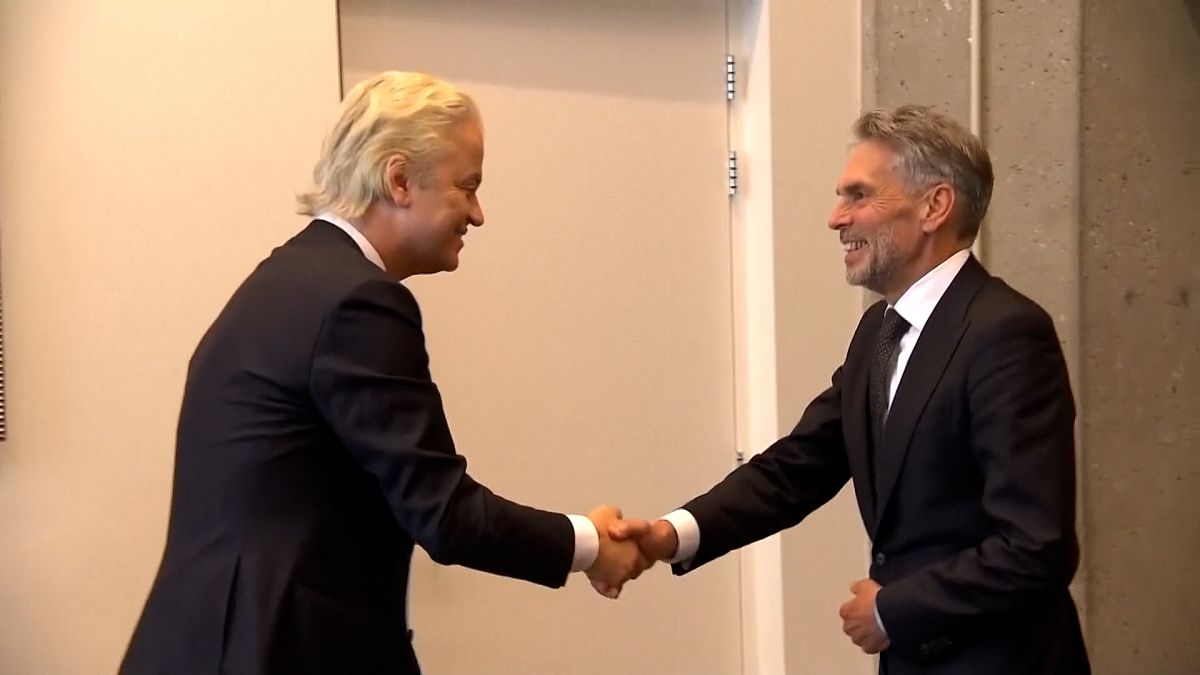Movie Reviews
La Chimera (2023) – Movie Review
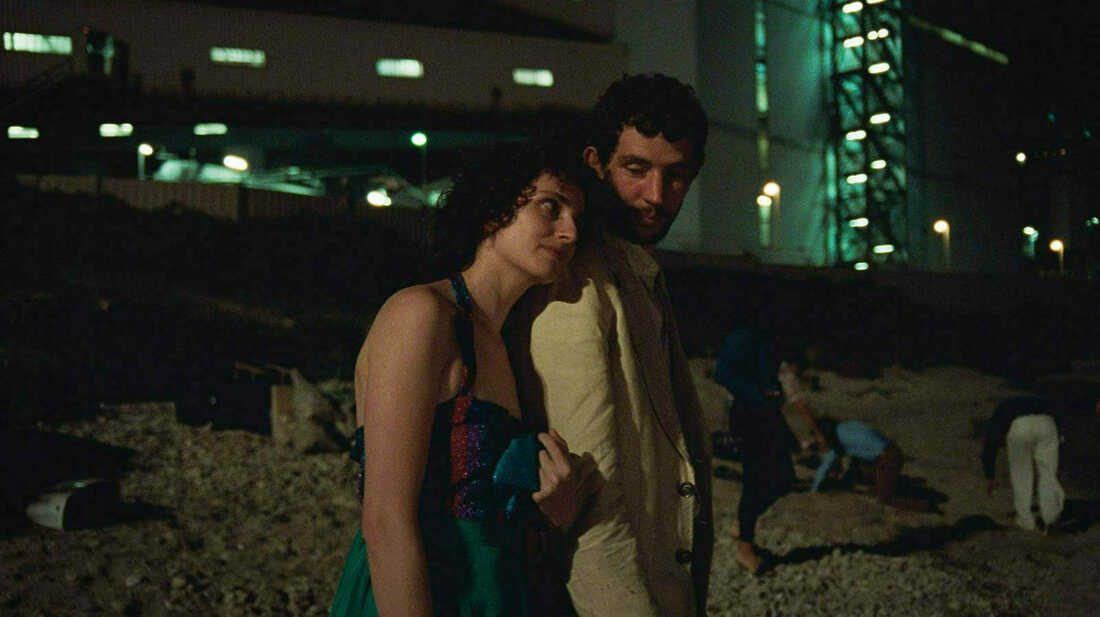
La Chimera, 2023.
Directed by Alice Rohrwacher.
Starring Josh O’Connor, Carol Duarte, Vincenzo Nemolato, and Isabella Rossellini.
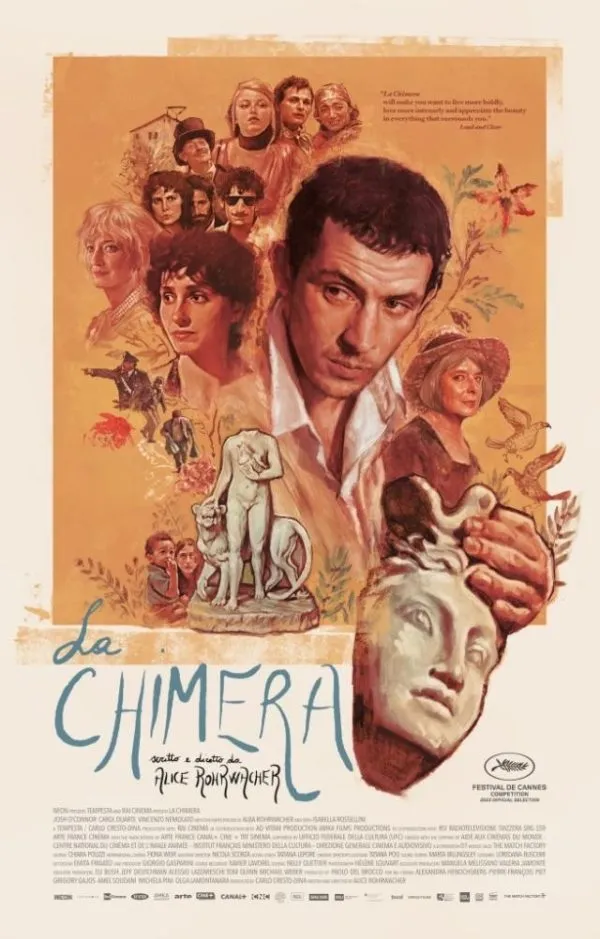
SYNOPSIS:
Everyone has their own Chimera, something they try to achieve but never manage to find. For the band of tombaroli, thieves of ancient grave goods and archaeological wonders, the Chimera means redemption from work and the dream of easy wealth. For Arthur, the Chimera looks like the woman he lost, Beniamina. To find her, Arthur challenges the invisible, searches everywhere, goes inside the earth – in search of the door to the afterlife of which myths speak. In an adventurous journey between the living and the dead, between forests and cities, between celebrations and solitudes, the intertwined destinies of these characters unfold, all in search of the Chimera.
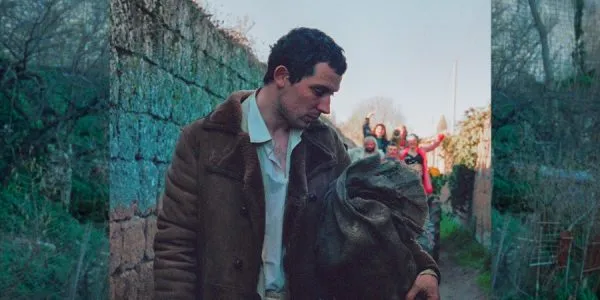
Italian Director Alice Rohrwacher has built an acclaimed career around films that mix reality and fantasy to perfection. Her latest film La Chimera continues this trend, depicting a lovelorn Englishman Arthur (Josh O’Connor) in 1980s Italy working with a gang to steal historical artefacts from local graves and selling them through a mystery bidder. While it may seem an odd premise, it is never less than captivating for its 2hr 10-minute runtime, balancing a world of ideas, mysterious, beguiling and distinct.
Italy here is a far cry from some of the more glamorous depictions of major Hollywood movies, this is an idyllic, rural community with a sense of poverty, perhaps at odds with the value of Arthur and Co’s finds. It is a clever juxtaposition between both the recent past and ancient history and playing with our sense of history and memory.
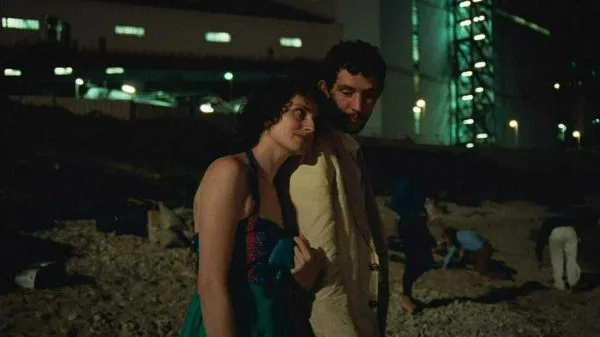
O’Connor gives a transformative performance speaking almost entirely in Italian and imbuing Arthur with a sense of internal turmoil that we slowly unpack, what is he running from and why does he seem so lost? We find out his love Beniamina is dead and Arthur is still processing her loss, after spending some time in prison. He gives off a cool air, chainsmoking with a white suit, which has been compared to Elliot Gould in Robert Altman’s The Long Goodbye. The supporting Italian cast ably supports O’Connor with Isabella Rossellini featuring in a small but vital role as Flora, whom Arthur resides with, a mentor figure for him.
What is perhaps La Chimera’s greatest achievement is balancing its contemplative emotional beats with a commentary on the nature of history and antiquities Rohrwacher perhaps acknowledges how many museum items are stolen. There is a spiritual feel to things that adds a fantastical layer as Arthur seeks a way to reconnect with his lost love, this also makes us question what we are seeing, is everything playing out how we think, is there something else at play? It’s these questions and layers that make this such a unique and mystifying film.
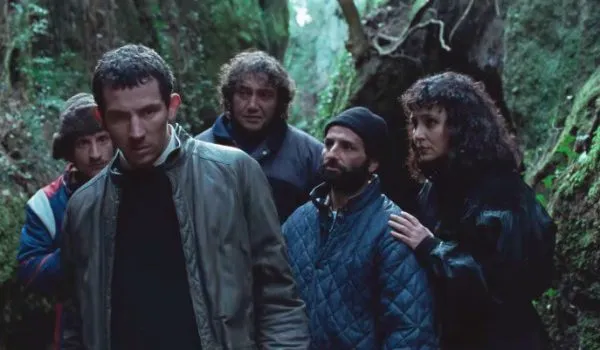
Never quite going where we might expect with hidden meaning lurking behind every corner, it is easy to fall under La Chimera’s spell. It feels like a film from years gone by in the best way possible, showing a side of Italy so rarely captured in mainstream film. It is at times both a critique of the world of archaeology and a deep, meaningful glance at how losses linger, the bizarre marriage of the two miraculously in sync.
Josh O’Connor, who is of course on a hot streak with Challengers, is magnificent giving off a cool exterior while anguishing on the inside, losing himself in this dangerous yet exhilarating world. This further cements Alice Rohrwacher as a filmmaker of the highest order a singular talent.
Flickering Myth Rating – Film: ★ ★ ★ ★ / Movie: ★ ★ ★ ★
Chris Connor
https://www.youtube.com/watch?v=embed/playlist

Movie Reviews
Boy Kills World: Bill Skarsgard stars in blood-soaked thriller

2/5 stars
Exploding onto the screen like the bastard son of a dozen 1980s action movies and an arcade full of beat-’em-up video games, Boy Kills World is a whirl of blood-soaked martial arts and jet black humour that barely pauses for breath.
Over the course of two hours, Boy tears through the hierarchy of a near-future dystopia in the hopes of destroying the regal Van Der Koys, responsible for murdering his family.
The hook to Boy Kills World is that, because of his debilitated senses, Boy narrates his every waking moment through an incessant internal monologue, in a voice lifted from his favourite childhood video game, Super Dragon Punch Force 3.
Comedian and voice artist H. Jon Benjamin (Archer, Bob’s Burgers) provides Boy with the vocal identity for his relentlessly self-aware, comic-book-style voice-over.
Hilda Van Der Koy (Famke Janssen) rules with an iron fist, staging an annual “culling”, whereby a dozen enemies of the state are ceremonially executed in front of the people.
Such a fate befell Boy’s own mother and sister, and he has spent the years since living in hiding, honing his body into a lethal weapon under the brutal tutelage of Yayan Ruhian’s unforgiving Shaman.
Once Boy is set in motion, there is no stopping the swathe of bloody carnage he unleashes.
First-time writer-director Moritz Mohr shot the film in South Africa, which lends it a visually distinctive otherworldliness, but beyond this cosmetic exoticism, Boy Kills World ploughs a painfully familiar path.
Its sustained tone of fast-paced choreography, splashy violence and knowingly irreverent humour soon becomes exasperating, leaving it with no other option than to barrel towards a wholly predictable finale.

Skarsgard’s performance must be commended for its physicality, but ultimately Boy Kills World becomes as much of a physical ordeal to watch as for its hero to survive, and will surely prompt all but the most resilient of viewers to tap out long before justice is served.
Movie Reviews
Movie review: The Teacher's Lounge – Law Society Journal

Idealistic young teacher Carla Nowak (played with anxious intensity by Leonie Benesch) is a new arrival at a German secondary school. Well-meaning and empathetic, she is the conductor of a peaceful classroom. A shot of Carla from behind, her arms beautifully outstretched, suggests this is her daily orchestra. She is organised and dedicated, if a touch closed off from her fellow teachers.
But when a student of Turkish origin is accused of stealing money, and Carla’s own surveillance of the teachers’ lounge indicates the guilt of Friederike Kuhn, an administrative staff member, we realise she’s far from in control. Carla’s star pupil, Lukas (Mrs Kuhn’s son), resents the accusation aimed at his mother. The students rally around him and the teachers, divided by internal disagreements, seem almost powerless to assert control.
Long gone is the strict discipline of The 400 Blows or Dead Poets Society. The students in the film seek neither escape to the outside world nor solace in the rich inner worlds sparked by poetry. As they have been taught, these students seek answers. They seek justice. As the editor of the student newspaper boldly declares that, outside of truth, “everything else is just PR.”
The path to maturity for the students seems not to lie in compromising their ideals but in sticking to them ever more fiercely. It’s a wonderful inversion of what the Germans call “Bildung,” the tradition which examines the formative years of youth, marked as it is by a certain moral education. But the students cede no ground. They are uninterested in the murky give-and-take of the adult world. Their world is zero sum.
Indeed, it is the teachers’ uncertain sense of themselves as disciplinarians and moral leaders that provides so much fuel for the plot. They do not know who they are, and the students grasp it quickly. Carla in particular has ideals, but does she really believe in them? Çatak satirises the speed at which the right to privacy, freedom of the press, and the concept of innocent until proven guilty are upended in the search for a thief. It’s quite an achievement, especially given that thrillers are rarely satirical, and satires seldom thrilling.
The film moves so briskly that viewers can be forgiven for failing to notice that on Carla’s surveillance video, Mrs Kuhn’s blouse is patterned with little stars. It’s a knowing nod to Germany’s tragic past. That Mrs Kuhn also represents a slightly different power struggle within the school – between the teachers and the administrative staff – adds more complexity to The Teachers’ Lounge. One can only hope that the next films concerning the consequences of accusation are so richly engaging.
Verdict: Five stars
Movie Reviews
‘Black Dog’ Review: Man Bites Dog, Becomes His Best Friend in Gorgeously Offbeat Canine Caper From China

Chinese director Guan Hu’s visually stunning new feature, Black Dog, starts off with a familiar premise: After spending a decade behind bars, an ex-con named Lang (Eddie Peng) returns to his tiny native city in Northwest China on the outskirts of the Gobi Desert. He tries to integrate into regular life, but certain demons from his past come back to haunt him.
If this sounds like any number of throwaway B-movies, or like the plot of the recent Sylvester Stallone series Tulsa King, be advised that Black Dog is not that kind of thing at all. First off, it’s unclear who, exactly, the title is referring to. Is it the film’s total outcast of a protagonist, who barely utters a full sentence to anyone — including his own father — as he attempts to settle into a place that doesn’t want him? Or is it the stray black greyhound he meets in town, with whom he winds up forming a special bond?
Black Dog
The Bottom Line Not your average pup.
Venue: Cannes Film Festival (Un Certain Regard)
Cast: Eddie Peng, Tong Liya, Jia Zhang-ke, Zhang Yi, Zhou You
Director: Guan Hu
Screenwriters: Guan Hu, Ge Rui, Wu Bing
1 hour 46 minutes
Black Dog isn’t really a man’s-best-friend movie either, even if the relationship between Lang and his rabid mutt forms the crux of the plot. Set against a backdrop of urban blight and canine chaos, Guan’s highly original, deadpan thriller begins with a jarring sequence of dogs causing a bus to flip over on a desert road, only to get weirder and wilder from there. But at its heart, the film is really a classic story of redemption, taking lots of unexpected turns as it follows a down-and-out hero toward recovery.
The director’s previous efforts, including big-budget action flicks like Mr. Six and The Eight Hundred, are a far cry from the oddball tone and arthouse stylistics of Black Dog, which sits somewhere between the Coens’ No Country For Old Men and recent Chinese noirs like Diao Yinan’s The Wild Goose Lake. There’s some violence, but never of a particularly graphic kind, and there’s definitely some cruelty to animals. But the film is mostly about a very strange time and place, where men and dogs seem to be forever chasing each other around a desolate city on the verge of state-sponsored demolition.
Set in 2008 during the months leading up to the Beijing Summer Olympics, the story picks up Lang — lanky, brooding and with a shaved head — after he survives the opening bus crash and wanders into town to take up residence in his childhood home. We learn that his father has moved out and lives at the local zoo, while a mob boss named Butcher Hu (played by Chinese auteur Jia Zhang-ke) is seeking revenge for the crime that put Lang in jail for a decade, details of which are divulged much later.
The only true companion Lang makes upon his return is a mangy greyhound he runs into by one of the city’s many abandoned buildings, which is set to be destroyed in a massive urbanization plan that’s left much of the area populated by packs of stray pups. Guan makes sure to include a canine or two in nearly every shot of his movie, whether they’re silently watching the action from afar, strolling in the background, rushing through empty streets, or, in one standout stunt scene, crashing through a window.
Cinematographer Gao Weizhe’s superb widescreen images, bathed in dust and washed-out colors, constantly place Lang and his canine pal (who is never given a real name) within the vast uninhabited cityscapes and surrounding desert. With sand constantly blowing in from all sides, dogs running amok and other animals (serpents, tigers, monkeys) wandering about, it’s as if nature is taking its revenge on the forgotten town while the rest of China prepares to triumph when the Summer Olympics kick off in August.
Lang eventually reconnects with his father and manages to deal with Butcher Hu — an actual butcher who specializes in the local delicacy of snake meat — but more importantly, he winds up taking the black dog under his wing and nursing her back to health. Initially, it’s because Lang fears the greyhound gave him rabies, but their story gradually transforms into one of love at first bite. Man and hound not only get to know each other, but they start helping each other out in special ways that improve both of their lives.
Hollywood seems to put out a new mainstream dog flick every few months — the latest example being the Mark Wahlberg starrer, Arthur the King — but there’s also a subgenre of international films that treat canines with more depth and artistry. Guan’s strange and seductive new work belongs to the latter pack, joining other movies that have premiered in Cannes over the past decade, such as last year’s Palme d’Or and Oscar winner Anatomy of a Fall, where dogs become a pivotal feature of the plot.
While Black Dog didn’t walk away with Cannes’ cheeky Palme Dog prize for films of that category (it went to French actress-director Laetitia Dosch’s Dog on Trial), it did scoop up a well-deserved Prix Un Certain Regard — no small feat in a sidebar that many believed outshined this year’s main competition. This should give Guan’s latest some traction beyond China, where he has already proved his bona fides as a major commercial filmmaker (The Eight Hundred grossed a whopping $460 million), and now proves he’s capable of making something both out-of-the-box and oddly captivating.
-

 Movie Reviews1 week ago
Movie Reviews1 week ago‘The Substance’ Review: An Excellent Demi Moore Helps Sustain Coralie Fargeat’s Stylish but Redundant Body Horror
-

 Culture1 week ago
Culture1 week agoFrom Dairy Daddies to Trash Pandas: How branding creates fans for lower-league baseball teams
-

 Movie Reviews1 week ago
Movie Reviews1 week ago‘Rumours’ Review: Cate Blanchett and Alicia Vikander Play Clueless World Leaders in Guy Maddin’s Very Funny, Truly Silly Dark Comedy
-

 News1 week ago
News1 week agoVideo: A Student Protester Facing Disciplinary Action Has ‘No Regrets’
-

 World1 week ago
World1 week agoPanic in Bishkek: Why were Pakistani students attacked in Kyrgyzstan?
-

 Politics1 week ago
Politics1 week agoAnti-Israel agitators interrupt Blinken Senate testimony, hauled out by Capitol police
-

 Politics1 week ago
Politics1 week agoMichael Cohen swore he had nothing derogatory on Trump, his ex-lawyer says – another lie – as testimony ends
-

 News1 week ago
News1 week agoCity of Kyle falls short of ‘Kyle’ world record















